Yehuda Ganut: "Are We the Ones Making the Mess? Come to the Parks and See the Truth"
Yehuda Ganut only wanted some peace and quiet under his window, but this led to the founding of 'Haredim for the Environment,' an organization dedicated to cleaning Haredi cities and raising awareness about environmental protection. "People are surprised that this is my interest, but I tell them that precisely as a Haredi, I must be involved," he says. And how does he respond to claims about Haredim littering in parks?
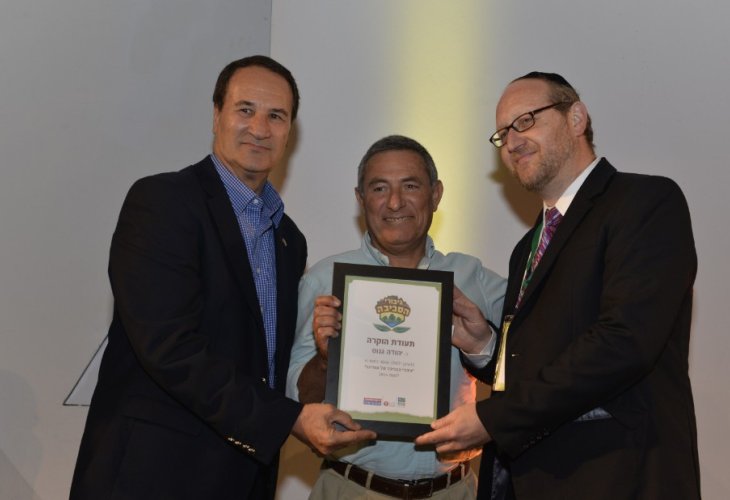
About twenty years ago, Yehuda Ganut was in a severe car accident which led to a lengthy hospitalization involving a series of surgeries, lasting over three months, followed by an extended rehabilitation. Finally returning home, all he wanted was to rest, but unfortunately, it wasn't possible. "I live in Petach Tikva, in the Hadar Ganim neighborhood," he says, "and my house is at the end of the neighborhood, right next to a bus terminal. Below my house, sixteen buses would regularly park, making noise constantly. The noise was unbearable, and since I spent all day at home—I couldn't rest for a moment."
In his frustration, he decided to turn to the municipality and the Ministry of Transport, repeatedly pestering them. "During that period, I wasn't short of money due to insurance, nor was I short of time since I was on sick leave. The only thing I lacked was peace, and when I realized that neither the municipality nor the Ministry of Transport were addressing my issue, I tried reaching out to various environmental organizations. I discovered that there were many organizations focusing on environmental quality, but each dealt with entirely different areas."
Incidentally, Ganut emphasizes that he approached all the organizations and entities not as an individual suffering from bus noise, but as a neighborhood representative. "I've always been very active in the neighborhood and, among other things, served as the neighborhood committee chairman. It was in this role that I contacted all the organizations."
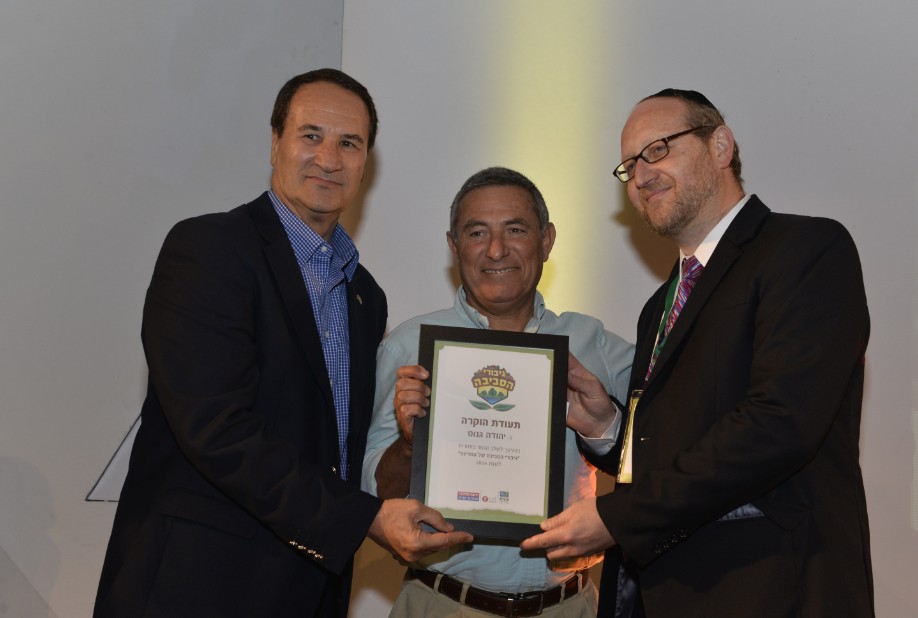
The Legend of the Messy Haredim
Ganut didn't find a perfect solution to his problem, but during his search among various entities, he encountered an organization called 'Air to Breathe,' consisting of three women working non-profit, who informed him that they were willing to help. "I was very impressed," he says, "that three women not from the Haredi sector wanted to help me and my community. They came specifically to the neighborhood for this purpose and then told me something interesting: 'We don't have a way to eliminate the noise, but as an organization dedicated to clean air, we must bring to your attention the severe air pollution here. Sixteen bus routes park under your house, very close to a kindergarten, constantly emitting toxic gases. The children spend many long hours in the kindergarten yard, inhaling fuel fumes. If you decide to address this issue, we can assist you.' At that moment, Ganut decided to change course. He didn't stop working to eliminate the noise but decided to also address air pollution, which quickly led to dealing with other issues such as city improvement and environmental cleanliness.
Shortly thereafter, he was invited to a course by environmental organizations designed to teach people to become environmental leaders, and from there, it was a short distance to founding 'Haredim for the Environment'—the only Haredi organization dedicated to a clean environment.
Initially, people were astonished, rolling their eyes and unable to understand what a Haredi person had to do with environmental concerns. "I was questioned from both directions," Ganut says with a smile, "I heard it from the general public because I participated in many organizational conferences, and I found out there are hundreds of organizations under the 'environmental quality' umbrella. Practically every 'Association of Lark Enthusiasts in Nahariya' or 'The Battle Against Asbestos in Dimona' quickly brands itself as such, but Haredi organizations are not even on the map. The general public holds many negative opinions about the Haredi sector regarding environmental cleanliness, and I see it as my mission to show them how their claims are wrong and absurd. I mostly hear claims that 'Haredim leave the parks dirty,' and I tell them, 'Go see the parks after Independence Day and after Shabbat—days when the Haredim aren't there.' Look at how many wrappers there are and leftover barbecue. It's not that Haredim don't need to improve, but the problem is for the entire population, not just them."
"Additionally, I am often invited to lecture and discuss topics like—why do we need kosher slaughtering? And—what is the idea of redeeming kaparot? These subjects greatly concern people from those organizations, and I try to be prepared for them, bringing in as much *Yiddishkeit* and *Kiddush Hashem* as possible."
Conversely, Ganut notes that the Haredi community was also surprised by his involvement in the matter, which seemed very unusual and not always understood. "Friends would stop me and ask: 'Of all the fields in the world, you couldn't find another area to engage in besides improving the environment?'" he notes with a smile.
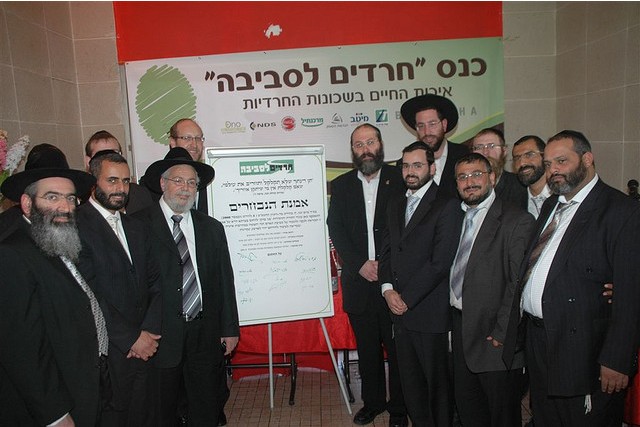
The truth is that it can be understood why a yeshiva student from Bnei Brak, a father of a large family, is concerned about many other topics such as livelihood, children's education, home maintenance, and more, besides the concern for a clean environment
"Maybe it's true, but I don't think there's a connection between things. In the past, I had the opportunity to go on a tour of my neighborhood with the Mayor of Petach Tikva, and I showed him where improvements were needed and what should be done. He tried all the way to find something to show me that we're 'not okay' either. The moment he found some empty wrappers of Bissli and Bamba on the sidewalk, he asked me: 'What is this? Look at how you're littering.' I couldn't hold back, and although because of my accident it's hard for me to bend down, I bent down and picked up all the wrappers, then looked the mayor in the eyes and asked him: 'Dear Mayor, where should I put the wrappers? Look around, there's no garbage bins here at all.' The mayor was shocked. It was the first time he noticed that we don't have garbage bins in our neighborhood. I think that not only in Petach Tikva, but also in other cities, there are certain budgets that the municipality allocates to neighborhoods. In secular neighborhoods, the budgets are usually directed towards improving and enhancing the neighborhood, while in Haredi neighborhoods they focus mainly on community events like Siyum HaShas, synagogue inaugurations, and the like. Of course, these are extremely important events, but that doesn't stand in contradiction to the need to improve the city’s appearance, requiring additional budgets. We can't give up on that."
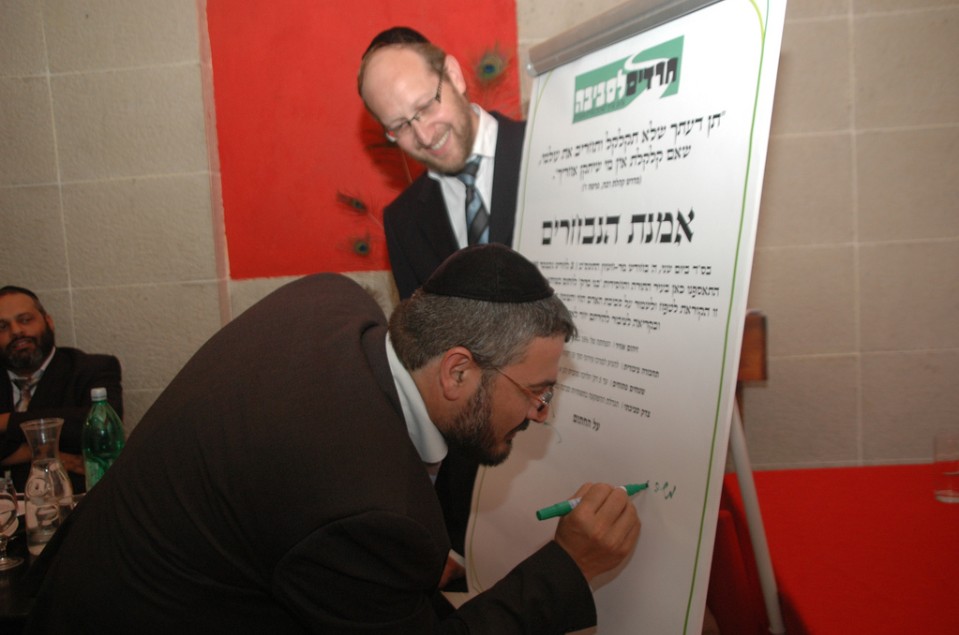 Mayor of Beit Shemesh - Signing an Environmental Agreement at a Conference of Haredi Council and City Leaders
Mayor of Beit Shemesh - Signing an Environmental Agreement at a Conference of Haredi Council and City LeadersAre you fighting for this cause?
"Certainly. Today, we are considered a very recognized organization, approached by Haredi concentrations all over the country, with various requests. Sometimes it involves complaints about odor nuisances, or noise, and there are mostly complaints about cleanliness. We strive to help wherever we can, and if necessary, we refer to other organizations we are in contact with. I believe environmental issues concern all of us in the end, but most of us feel it's 'part of life' and we need to try to cope and live like this. It's not right; in many cases, it can be handled, and there's no reason not to do so and live better lives."
These days, 'Haredim for the Environment' is accompanying Jerusalem families selected by the municipality to be 'Cleanliness Trustees.' "It's a very special and interesting project," he notes, "these families take responsibility for running an educational environmental project and being in charge of the issue in their area. I'm very happy to see people who care, but of course, they need encouragement and awareness."
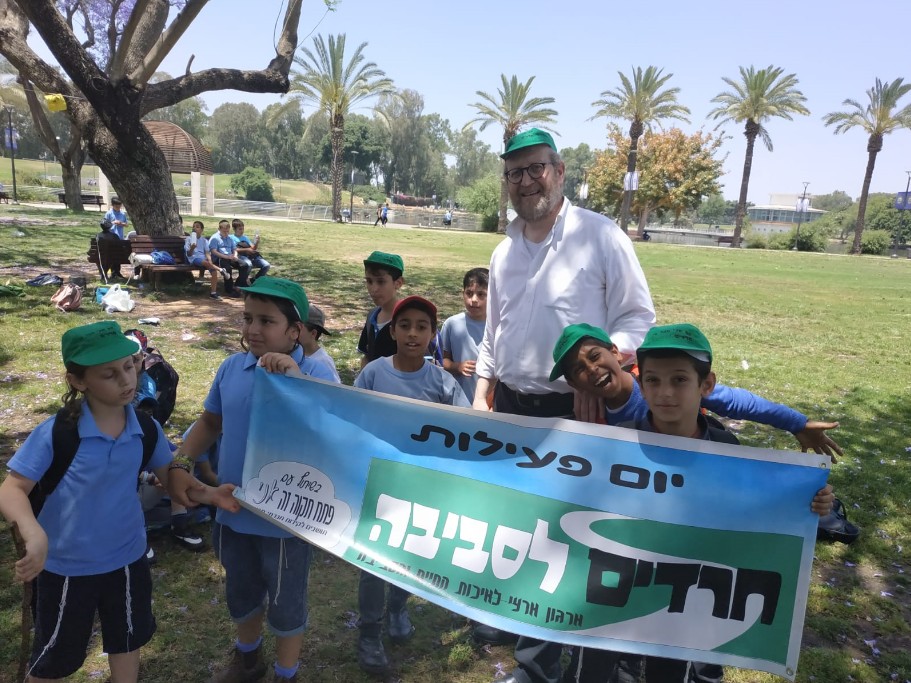
Not a Fanatic, an Idealist
Ganut points out that throughout his journey, he tries to promote changing habits, teaching people to consume fewer disposable utensils, use fewer plastic bags, and lead a cleaner lifestyle.
Honestly, do you think there's a chance to change the habits people have adopted over the years?
"It's certainly not easy or simple. I tried approaching yeshiva house managers to talk to them about transitioning to reusable utensils. They explained that from an economic standpoint, it’s more cost-effective to use disposables, and what can I say? On the other hand, we all dealt with huge amounts of plastic bags taken from supermarkets for years; you would walk down the street and constantly see bags flying in the wind. Once the law regarding payment for bags came in, these sights are seen much less. People use plastic bags thoughtfully and don't just take ten bags when they can make do with one. So yes, apparently there are solutions, and we need to know how to find them."
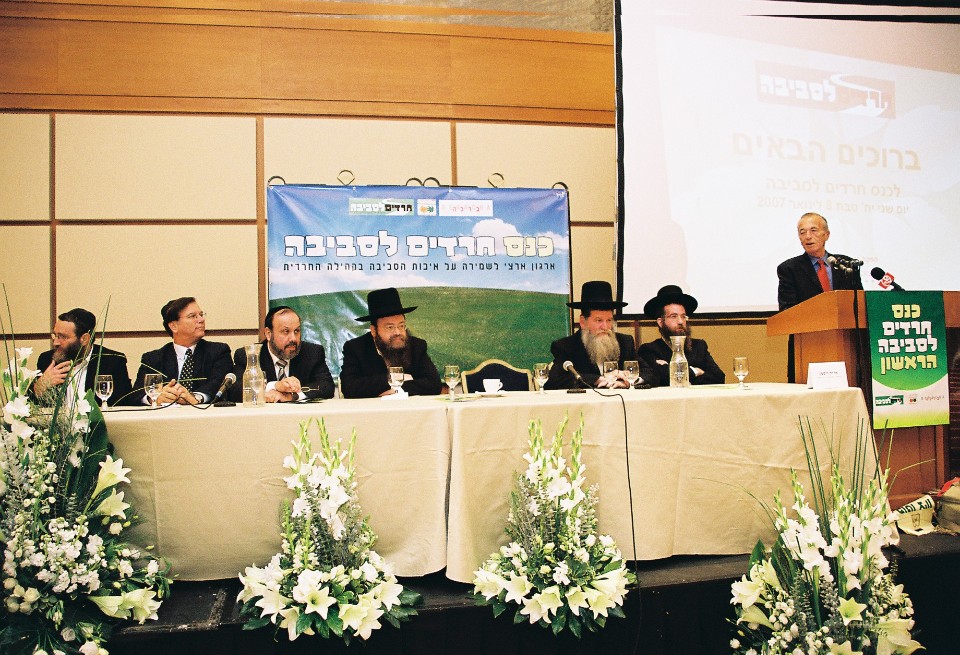 The first 'Haredim for the Environment' Conference with the participation of Knesset members and Haredi city mayors. Speaker: The Minister of Environmental Protection Gideon Ezra, of blessed memory
The first 'Haredim for the Environment' Conference with the participation of Knesset members and Haredi city mayors. Speaker: The Minister of Environmental Protection Gideon Ezra, of blessed memory"It's important to emphasize that I'm not here to educate people to become 'fanatics' on the subject. I myself am not a fanatic, but I am an idealist. I am aware of my environment and want to approach it thoughtfully and without disdain. We, as a Haredi society that cares for itself and its quality of life, owe this to ourselves. A few years ago, when recycling corporations and the Ministry of Environmental Protection announced a nationwide campaign promising a prize of 20,000 shekels for whoever recycles the most bottles, the winners were high school girls from Bnei Brak. They decided to donate the money to their friend, the bride, and indeed succeeded in their mission. They won the campaign not once, but year after year, consecutively, with each girl bringing bags full of bottles for recycling every Sunday to the seminary. Again, this proves that everything is possible, provided thoughts and importance are given."
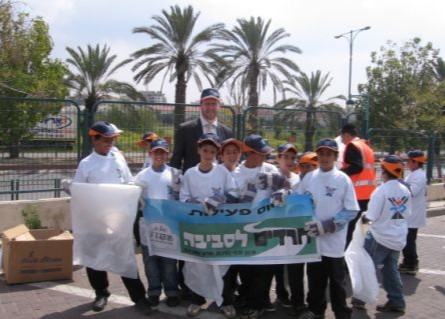 A class of a Haredi school on a national cleanup day by 'Netivei Ayalon'
A class of a Haredi school on a national cleanup day by 'Netivei Ayalon'Finally, what is your vision?
"I mainly look at the past and strive to build the future accordingly. I can only say one thing— the first Ministry of Environmental Protection was not built in the State of Israel nor in any other known country, it was back in the time of the Babylonian Talmud, and you can see in the sources mention of topics like how to avoid noise damage and the law regarding causing odor damage, etc. My hope is that people will understand that the concern for environmental issues is indeed founded on Judaism and is an inseparable part of it. Therefore, it is so clear that we, in particular, should be the ones leading it forward."

